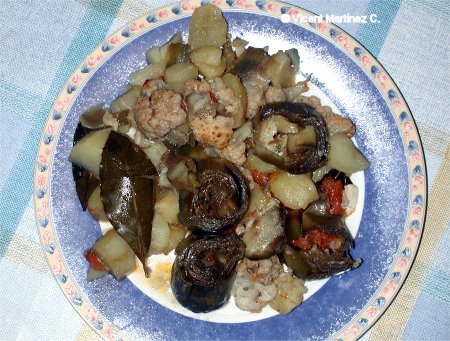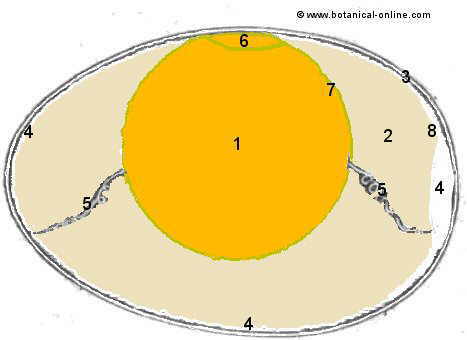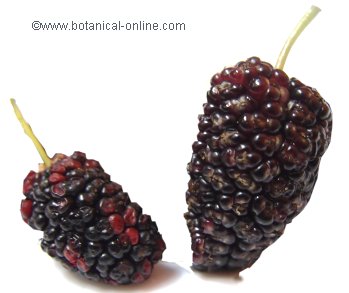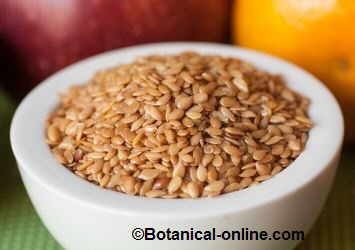Contents
- 1 Suitable food for ulcerative colitis
- 1.1 Importance of food in ulcerative colitis
- 1.2 Nutritional recommendations in ulcerative colitis
- 1.3 Can I eat foods that have upset my stomach sometimes?
- 1.4 SUITABLE FOOD FOR ULCERATIVE COLITIS
- 1.5 Fruits and vegetables for colitis
- 1.6 What vegetables are recommended?
- 1.7 Cereals, tubers and legumes for colitis
- 1.8 Can you eat gluten in colitis?
- 1.9 Fatty foods for ulcerative colitis
- 1.10 Fish and meat for colitis
- 1.11 Do you have to take supplements?
- 1.12 Dairy substitutes
- 1.13 Diet for an outbreak or an attack of ulcerative colitis
- 1.14 Supplements for ulcerative colitis
- 1.15 Nutritional deficiencies in ulcerative colitis
Suitable food for ulcerative colitis
Importance of food in ulcerative colitis
Food has a key role in the control of ulcerative colitis.
A proper diet can help the patient with ulcerative colitis to space out the attacks and make these less severe when they occur. In other cases it has been found that, following a proper diet, many patients can reduce the amount of drugs because most of them improve their intestine state very much.
In this type of disease, control and advice from of a doctor and a clinical nutritionist expert in digestive diseases is always recommended
Nutritional recommendations in ulcerative colitis
Patients who have ulcerative colitis show intestinal malabsorption, so, they may easily experience vitamin and mineral deficiencies. A proper diet will help remedy these shortcomings.
Through food intake it is possible to improve the health of the intestine and prevent problems described in the hyperpermeable or leaky gut.
In general, the patient should be directed by a dietitian to help maintain a healthy diet. Medical control will also be essential.
Can I eat foods that have upset my stomach sometimes?
In general, those foods that are not well tolerated must be excluded from the diet, replacing them by other more accepted. As a rule, when a patient does not know clearly whether a food is recommended or not, it is better to eat it in small amounts to check if it is well tolerated.
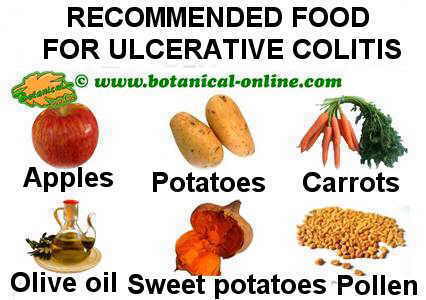
Some suitable food for ulcerative colitis.
SUITABLE FOOD FOR ULCERATIVE COLITIS
Among the recommended foods, we include the following:
Fruits and vegetables for colitis
Fruits are generally suitable because they agree with one’s stomach and provide some important vitamins and minerals.
Some fruits that have a better tolerance are apples, pears and bananas. Other fruits, such as melons, figs, apricots and cherries, are often poorly tolerated.
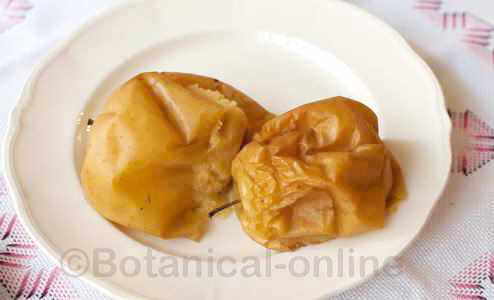
Photo of baked apple. Pear or apple boiled or baked are very well tolerated.
It is very interesting the intake of quince or applesauce, because they contain lot of pectin, a fiber tye that improves intestinal wellbeing. (Take 20g. Or 100ml quince or apple compote after each main meal)
Avocados are very interesting because they provide lots of healthy energy and much folic acid. You can eat them daily. Fresh coconut can also be recommended the for its high mineral content.
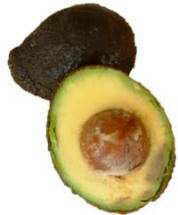
Avocados are highly recommended
What vegetables are recommended?
As for vegetables, the most recommended ones are: potatoes, carrots, zucchini, squash and sweet potatoes. Stewed or boiled, these are the vegetables that have better tolerance.
Among these plant foods, Those with orange and deep green color, such as carrots, sweet potatoes or pumpkins are rich in beta carotene, some components that help repair the digestive mucosa.
Cabbage, for its anti-ulcer and healing properties, is highly recommended, provided it is well tolerated. (Juice of raw cabbage, or in recipes).
Chips, onions, cabbage (sometimes), Brussels sprouts, cauliflower, peppers and radishes are vegetables that are worse tolerated.
Cereals, tubers and legumes for colitis
Among cereals, white rice, is the best tolerated recommended cereal. It has demulcent properties and provides energy, being a restorative and healthy food.
Other healthy choices among tubers are: potato, sweet potato or cassava.

Sweet potato, if it is well tolerated, is highly desirable because it provides calories and beta carotene.
It is not appropriate to use whole grains and wheat bran, quinoa (saponins) in many cases, since they usually don’t agree with ulcerative colitis.
Legumes are often poorly tolerated foods for people with colitis. They are not recommended in general, or should be consumed after a long soak and a long cooking. (Consult your specialist)
Can you eat gluten in colitis?
White bread and pasta (not whole) may also be recommended. However, grains with gluten can cause intestinal discomfort to some people, so it is advisable to avoid taking wheat and bread when there are episodes of pain or diarrhea. Eat rice and tubers instead.
Cereals provide a high amount of vitamin B complex, although whole grains are not recommended because they can cause gastrointestinal irritation.
Other experts advise against gluten in these diseases. It is best to go to the doctor and receive personalized advice before eliminating foods on your own.
Fatty foods for ulcerative colitis
Generally avoid heated oils, that is to say, avoid fried foods, stir-fries and sauces high in fat, because they are clearly harmful.
Moreover, healthy fats can be very beneficial. Non refined vegetable oils obtained by cold pressing are highly recommended.
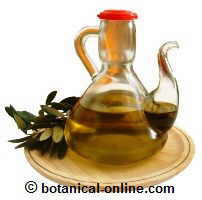 Olive oil is recommended Olive oil is recommended |
– Olive oil: Olive oil is the most recommended type of oil because of its composition. Preferably extra virgin raw olive oil must be used because it contains more vitamin E and flavonoids (they help repair the intestinal mucosa).
It is also the best oil to use in the kitchen as it better tolerates cooking temperature than other seed oils.
If you do not have olive oil, coconut virgin oil can be used for cooking because its saturated fat makes it more stable to heat.
Other suitable oils to use in crude are wheatgerm oil (1st cold pressing), unrefined sunflower oil, etc.
– Nuts: They can provide lots of calcium (especially sesame seeds), a mineral that in ulcerative colitis patients can poorly absorb.
However, many patients poorly tolerate these foods so it must individually be tested to see whether any of these fruits causes any reactions. Peanuts, for example, are often very poorly tolerated.
Fish and meat for colitis
In case of non-vegetarian diets, you can also eat:
– White fish (hake, monkfish,…): It is the best tolerated and more recommended protein source. Fish is recommended in soups, steamed or boiled, as it is a soft food, with a better digestion than meat, better tolerated than eggs, and very rich in protein. Cod is not tolerated and sometimes a small amount should be tested before eating it normally.
– Meat: The recommended meat to be eaten is white meat such as chicken, turkey and rabbit. As in the case of fish, it should be soft cooked: boiled, papillote, with juicy texture. Not roasted, fried or grilled.
Other protein foods that may be less well tolerated than the previous ones are:
– Oily fish (tuna, salmon, mackerel, sardines,…) is not as well tolerated as whitefish, but it is interesting nutritionally because it is rich in essential fatty acids omega-3 EPA and DHA, which play an anti-inflammatory role, very suitable for the treatment of this disease. Seafood can agree in some patients, and disagree in others.
– Eggs: People with colitis should test the tolerance to eggs. Fried eggs should be avoided and eggs in omelettes, scrambled or boiled should be tested.
Do you have to take supplements?
The supplements should only be taken on medical advice, if the professional thinks they are appropriate.
If you do not eat food of animal origin, if women of childbearing age or even people eating meat but having recurrent intestinal outbreaks, you may be advised to use supplements of B vitamins (especially vitamin B12) and iron, due to the lack of absorption of these nutrients.
Are milk and dairy products recommended in case of colitis?
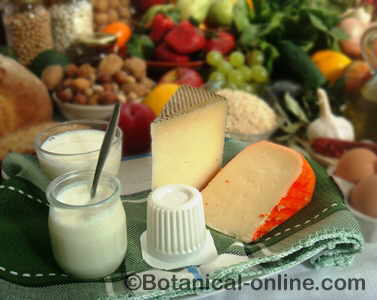 Yogurt is recommended for its contribution with healthy bacteria. It is preferable to replace milk by fortified soy beverage. Yogurt is recommended for its contribution with healthy bacteria. It is preferable to replace milk by fortified soy beverage. |
Some experts recommend removing dairy in case of intestinal diseases such as colitis.
Most ulcerative colitis patients do not tolerate milk and dairy products, especially those made with whole milk (cheese, yogurt, butter, cream, etc).
If dairy food is tolerated, the most recommended is yogurt, because of its low lactose content and its contribution with healthy bacteria to the intestinal flora (probiotics).
Dairy substitutes
If milk is not tolerated, dairy should be replaced by vegetable drinks enriched with calcium and vitamin D, Soy milk is well tolerated and one of the richest vegetable drinks in protein and magnesium.
Milk and dairy products are generally recommended as sources of calcium, but, for people with ulcerative colitis, there are other better foods rich in this mineral.
Diet for an outbreak or an attack of ulcerative colitis
During attacks of ulcerative colitis the presence of strong stomach pains, with cramps and diarrhea, makes very difficult to provide a proper diet.
It is important, in this moment, to consider the following tips:
– Go to the doctor
– Drink plenty of water: To prevent dehydration you should drink at least 2 liters of water daily.
– Eat little heavy foods: During these attacks, it is important to eat light foods in small amounts. Among which there are well suited ones, such as potatoes, white rice, carrots, applesauce, shredded carrots, etc. If tolerated, dress your meals with good quality oil. Cooking methods: boiled and steamed.
– Eat low fat foods and low in fiber
Supplements for ulcerative colitis
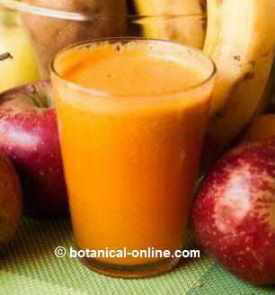 Apple and carrot juice with a teaspoon of wheat germ oil cold pressed is recommended. Apple and carrot juice with a teaspoon of wheat germ oil cold pressed is recommended. |
It is important to prevent energy deficit in your diet, through increasing the calories of the dishes. It can be done by adding sugar into nutritional preparations such as smoothies, in the applesauce, etc. (Honey or fructose is not recommended for possible intestinal discomfort). With the same purpose, in addition to water, you can drink apple juice.
Some supplements that can improve nutrition in these situations are:
– Carrot juice or cabbage juice: For the high beta-carotene content of carrots, or for the antiulcer and healing properties of cabbage (If cabbage is tolerated). Besides you can add other items such as 1 teaspoon pollen, wheat germ, spirulina or brewer’s yeast. Take at least 1 cabbage or carrot juice a day.
– Glucomannan: glucomannan fiber helps regulate intestinal transit and prevents too liquid depositions. (1 capsule glucomannan before meals with 1 glass of water).
– Supplements of vitamin B: Included vitamin B12, especially in vegetarian diets.
– Brewer’s yeast: Supplement rich in protein, B vitamins, iron, magnesium, and other minerals. It is recommended to buy flaked and introduce it in your preparations (in smoothies, purees, soups, salads, pasta, rice, etc.). It can also be purchased in capsules.
– Wheat germ: Supplement rich in essential fatty acids, folic acid, magnesium, selenium, zinc and other nutrients. Advisable to buy flaked to be introduced into the preparations. (In smoothies, purees, soups, salads, pasta, rice, etc.). It can also be purchased in capsules.
Nutritional deficiencies in ulcerative colitis
Among the vitamins and minerals that are often lacking in people with ulcerative colitis we have:
– Vitamins: Vitamin C (abundant in fruits), vitamin K (eat green leafy vegetables), and many B vitamins, including folate (plenty of this vittamin in avocado, spinach, cereals, fish and meat, vegetables and fruits).
– Minerals: As for minerals, we have to emphasize that patients with ulcerative colitis usually have very high potassium losses due to frequent evacuations. Also, iron poor absorption. A diet rich in food containg lot of iron or lot of potassium will help restore the levels of these minerals.
![]() More information on bad food for ulcerative colitis.
More information on bad food for ulcerative colitis.


